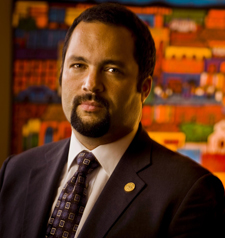This post is part of a special series by Rosetta Thurman entitled “28 Days of Black Nonprofit Leaders.” In honor of Black History Month, Rosetta will be “highlighting 28 Black nonprofit leaders who have done or are doing their part to make our world a bit better, a bit more hopeful for the generations that will come.”
In her introduction to the series on her blog, Rosetta writes, “I love Black History Month because it reminds me of how far we still have to go in this country in terms of race relations and giving everyone a fair chance to take part in the “American Dream.” How far we still have to go before Dr. Martin Luther King’s dream of social justice and economic opportunity for everyone will be realized. Fortunately, there are countless leaders out there who are continuing to address so many aspects of social change.” The SSIR is proud to publish some of their stories.

Benjamin Jealous is President and CEO of the NAACP.
Are you enjoying this article? Read more like this, plus SSIR's full archive of content, when you subscribe.
From the NAACP website:
Benjamin Todd Jealous grew up believing that there was no higher calling than to further the cause of freedom in this country and in the world. It is a mindset he inherited from of his parents and grandparents. Their drive for community betterment blazed the trail for Jealous’ own deep commitment to social justice, public service and human rights activism. Now, as the 17th President and Chief Executive Officer of the NAACP, and the youngest person to hold the position in the organization’s nearly 100-year history, Jealous is well positioned to answer the call.
During his career, he has served as president of the Rosenberg Foundation, director of the U.S. Human Rights Program at Amnesty International and Executive Director of the National Newspaper Publishers Association (NNPA), a federation of more than 200 black community newspapers. From his early days of organizing voter registration drives up until his nomination and election as NAACP president, Jealous has been motivated by civic duty and a constant need to improve the lives of America’s underrepresented. All things considered, Jealous’ leadership roles and active community involvement have well prepared him for his current duties as president of the NAACP. In fact, his path through journalism and the Black Press is not unlike several other former NAACP presidents, including Roy Wilkins, Walter White, Ida B. Wells and W.E.B. Dubois.
As a student at Columbia University, he worked in Harlem as a community organizer for the NAACP Legal Defense Fund. On campus, Jealous led school-wide movements, including boycotts and pickets for homeless rights, a successful campaign to save full-need financial aid and need-blind admissions when other national universities were cutting such programs, and an environmental justice battle with the University.
These protests ultimately led to the suspension of Jealous and three other student leaders. Jealous used this time off to work as a field organizer helping to lead a campaign that prevented the State of Mississippi from closing two of its three public historically black universities, and converting one of them into a prison. He remained in Mississippi to take a job at the Jackson Advocate, an African American newspaper based in the state’s capital. His reporting — for the frequently firebombed weekly — was credited with exposing corruption amongst high-ranking officials at the state prison in Parchman. His investigations also helped to acquit a small black farmer who had been wrongfully and maliciously accused of arson. His work at the Jackson Advocate eventually lead to his promotion to Managing Editor.
In 1997, Jealous returned to Columbia University and completed his degree in political science. With the encouragement of mentors, he applied and was accepted to Oxford University as a Rhodes Scholar where he earned a master’s degree in comparative social research.
Jealous eventually went on to serve as Executive Director of the National Newspaper Publishers Association (NNPA). While at the NNPA, he rebuilt its 90-year old national news service and launched a web-based initiative that more than doubled the number of black newspapers publishing online.
Most recently, Jealous was President of the Rosenberg Foundation, a private independent institution that funds civil and human rights advocacy to benefit California’s working families. Prior to that, he was Director of the U.S. Human Rights Program at Amnesty International. While there he led efforts to pass federal legislation against prison rape, rebuild public consensus against racial profiling in the wake of the September 2001 terrorist attacks, and expose the widespread sentencing of children to life without the possibility of parole.
Active in civic life, Jealous is a board member of the California Council for the Humanities, and the Association of Black Foundation Executives, as well as a member of the Asia Society. He is married to Lia Epperson Jealous, a professor of constitutional law and former civil rights litigator with the NAACP Legal Defense and Educational Fund. They presently reside in Washington, DC with their young daughter.
See also: Benjamin’s 2009 interview with the Chronicle of Philanthropy (video)
See also: Julian Bond’s interview with Benjamin during University of Virginia’s Explorations in Black Leadership series (video)
Support SSIR’s coverage of cross-sector solutions to global challenges.
Help us further the reach of innovative ideas. Donate today.
Read more stories by Rosetta Thurman.

